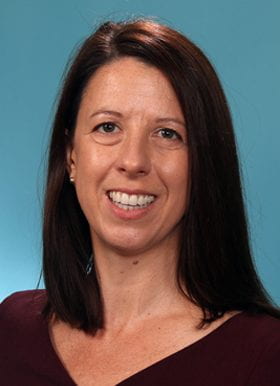Child and Maternal Health

Derek Brown, PhD
Associate Professor
- Phone: 314-965-8651
- Email: dereksbrown@wustl.edu
Derek Brown’s research focuses on costs, access to care, quality, and disparities among Medicaid populations—including physician payment, housing instability, and child maltreatment. He also uses discrete choice experiments to analyze preferences for health care and outcomes, such as screening and vaccination. His goal with this work is to improve valuation of health outcomes and policies and to promote better economic evaluation of public health policies.

Alexis Duncan, PhD
Associate Professor
- Phone: 314-935-6758
- Email: aduncan@wustl.edu
Alexis Duncan’s research focuses on risk mechanisms and psychiatric comorbidity of obesity, eating disorders and substance use disorders, particularly among women. Her additional research interests include nosology (the study of diagnostic criteria) of psychiatric disorders, the effects of child maltreatment, and differences in psychopathology by race, gender and sexual orientation.

Patrick Fowler, PhD
Associate Professor; Director, Doctoral Program in Public Health Sciences
- Phone: 314-935-5859
- Email: pjfowler@wustl.edu
Patrick J. Fowler's research aims to prevent homelessness and its deleterious effects on child, family, and community well-being. Trained in child clinical-community psychology, Fowler uses innovative methods that rigorously investigate policies and programs intended to promote housing and family stability. Recent research focuses on cross system collaborations to prevent child maltreatment associated with family homelessness, as well as youth homelessness in the transition from foster care to adulthood.

Tyriesa Howell, PhD
Assistant Professor
- Phone: 314-935-6934
- Email: thhowell@wustl.edu
Tyriesa Howard Howell's research focuses on examining and understanding social and cultural determinants of sexual and reproductive health among adolescents and women. She is particularly interested in the development of mHealth technology as an innovative approach to promoting sexuality health education for youth. Some of Howell's research engagement has included socio-behavioral interventions using mixed-methods to examine the use of interactive video game and life simulation technology to encourage HIV treatment adherence and routinized HIV testing among adolescents living with and affected by HIV.

Jean Hunleth, PhD, MPH
Assistant Professor of Surgery
- Phone: 314-747-8066
- Email: jean.hunleth@wustl.edu
Dr. Hunleth is a medical anthropologist with public health training and professional experience working in global health. Her research focuses on the experience of caregiving and treatment seeking for infectious and chronic diseases in Africa (most specifically, Zambia) and in the United States. She is especially interested in children’s experiences of and responses to illness, medicine, and health programming. Her work demonstrates that identifying children’s actions and perspectives facilitates the design of more appropriate and family-centered health interventions for children and adults. Hunleth’s approach to research is creative and rigorous. She uses ethnographic and qualitative interview and observational methods as well as participatory techniques such as drawing, role playing, and photography.

Lora Iannotti, PhD
Associate Professor
- Phone: 314-935-4396
- Email: liannotti@wustl.edu
Lora Iannotti has expertise in maternal and young child nutrition and nutrient deficiencies (zinc, iron, vitamin A, B12, choline, and fatty acids) related to poverty and infectious diseases. She applies epidemiological methods to investigate interventions aimed at reducing stunted growth and development. Iannotti leads projects in Haiti, Ecuador, and East Africa where she collaborates with local partners to test innovative, transdisciplinary approaches using animal source foods and small livestock and fisheries development. She is founder and director of the E3 Nutrition Lab, working to identify economically affordable, environmentally sustainable, and evolutionarily appropriate nutrition solutions globally.

Jessica Levy, PhD
Associate Professor of Practice
- Phone: 314-935-2789
- Email: jessicalevy@wustl.edu
Jessica Levy’s research focuses on the intersection between gender, poverty, and global maternal and child health. She aims to identify culturally appropriate interventions that promote gender equality and improve reproductive health and development outcomes. Levy is also a faculty scholar at the Institute for Public Health and a member of the School’s Global Advisory Committee.

Sara Malone, PhD
Instructor of Surgery
- Email: sara.malone@wustl.edu
Dr. Malone is interested in the quality of care provided to children when they are admitted to the hospital, particularly in acute and emergent settings. Dr. Malone uses expertise in implementation science, evaluation, and systems science to study how teams can best implement and sustain evidence-based programs and practices in these settings.

Mary McKay, PhD
Vice Provost of Interdisciplinary Initiatives
- Phone: 314-935-6693
- Email: mary.mckay@wustl.edu
Vice Provost McKay has received substantial federal funding for research focused on meeting the mental health and health prevention needs of youth and families impacted by poverty. Working with colleagues in the field, she has developed a substantial body of research findings around engagement practices to improve involvement in family-based HIV prevention programs and mental health services for children, youth, and families in high-poverty urban areas.
She has significant expertise in services and implementation research methods, as well as over 15 years of experience conducting HIV prevention and care-oriented studies, supported by continuous funding from the National Institutes of Health. In addition, Dean McKay has collaborated with the National Institute of Mental Health, the New York State Office of Mental Health, and the New York City Department of Health and Mental Hygiene to create evidence-based engagement interventions and to test models of dissemination and training for mental health professionals in engagement best practices

Proscovia Nabunya, PhD
Assistant Professor
- Phone: 314-935-9087
- Email: nabunyap@wustl.edu
Proscovia Nabunya's global research focuses on HIV-stigma reduction interventions, mental health, and family and community-based support systems as protective factors for the development and well-being of children and families impacted by HIV/AIDS. She has research expertise in poverty-reduction strategies that utilize asset-based interventions and their impact on children and families' social, economic and health well-being in HIV-impacted communities in sub-Saharan Africa. Nabunya's current NIMH-funded study known as Suubi4Stigma examines two evidence-based interventions, i.e. multiple family group and group cognitive behavioral therapy, to address individual and family-level HIV-associated stigma among adolescents living with HIV and their families in Uganda.

Ozge Sensoy Bahar, PhD
Research Assistant Professor
- Phone: 314-935-9403
- Email: ozge.sensoybahar@wustl.edu
Ozge Sensoy Bahar's research focuses on child and family well-being in global contexts characterized by poverty and associated stressors. Within this broad research program, her research examines the multi-level factors that expose children, youth, and their families to social and economic vulnerabilities, such as engagement in child labor, sexual risk-taking behaviors, and poor mental health functioning, all of which are associated with poverty.

Fred Ssewamala, PhD
William E. Gordon Distinguished Professor, Associate Dean for Transdisciplinary Faculty Research
- Phone: 314-935-8521
- Email: fms1@wustl.edu
Fred Ssewamala leads innovative, interdisciplinary research that informs, develops and tests economic empowerment and social protection interventions aimed at improving life chances and long-term developmental impacts for children and adolescent youth impacted by poverty and health disparities in low resource communities. He holds a joint appointment in the Washington University School of Medicine, and directs the International Center for Child Health and Development (ICHAD) and SMART Africa Center.

Lindsay Stark, DrPH
Associate Professor; Associate Dean for Global Strategy and Programs
- Phone: 314-935-2219
- Email: lindsaystark@wustl.edu
Lindsay Stark is a social epidemiologist and internationally recognized expert on the protection and well-being of women and children in situations of extreme adversity, with more than a decade of experience leading applied research with operational agencies such as UNICEF, UNHCR, International Rescue Committee and the Women's Refugee Commission. Stark measures sensitive social phenomena and evaluates related interventions to reduce violence, abuse and exploitation of women and children.